Far-right parties employed generative AI ahead of European Parliament elections
Europe-wide coalition Identity and Democracy utilized AI imagery despite signing a code of conduct on its use in the election campaign

Banner: Screen captures of an Identity and Democracy (ID) video featuring AI-generated images. (Sources: Meta Ad Library, X/archive, Telegram/archive)
In the lead-up to the European Parliament elections in early June 2024, political parties affiliated with the far-right coalition known as Identity and Democracy (ID) used generative AI as part of their electoral campaigns. The DFRLab also found that France’s Rassemblement National and Italy’s Lega, both ID member parties, used generative AI to support their political messaging. At the time of publishing, Rassemblement National had won European Parliament elections in France “by a landslide,” garnering 31.5 percent of the ballots.
The DFRLab found that ID has been using generative AI since at least autumn 2023, utilizing Midjourney and Stable Diffusion in dozens of instances. These synthetic images, which were promoted via social media, featured migrants purportedly “invading” the European Union (EU), tractors participating in farmers protests, or EU politicians portrayed in an unflattering light. Nearly all of these posts violated a voluntary code of conduct committing to the labeling of AI-generated content, among other transparency guidelines, which ID signed in April 2024. At the time of writing, the DFRLab could only find one case among the dozens identified of AI-generated content being labeled as such.
The code of conduct
ID and nine other Europe-wide political parties participating in parliamentary elections signed the code of conduct on April 9, 2024. As noted in a press release that day, the code was “jointly developed and negotiated by [European Commission] Vice-President [Věra] Jourová and International IDEA in close consultation with the European political parties,” and was intended to serve “as a comprehensive checklist for political parties, candidates, media, and citizens to monitor ethical campaigning for the upcoming European elections.” It was based in part on recommendations published by the European Commission in December 2023.
According to the code’s introduction, “European political parties and any member parties signing up to it commit to maintaining the integrity of the 2024 European Parliament elections.” It continued:
By following this code, the signatories uphold key election values like integrity, transparency, privacy, safety, fairness, and a level playing field. They recognize the vital role of political parties in safeguarding these values. Transparency empowers citizens to make informed decisions based on reliable information. Disinformation and manipulated content threaten free and fair elections. Signatories commit to the principles of truth and accuracy in their communication strategies and to countering mis- and disinformation in elections. The signatories are committed to preventing the deliberate deception of the public, including through the use of artificial intelligence, strengthening the integrity of European elections, and supporting trust in democracy. The pledges help to safeguard European elections against undue interference or manipulation by setting minimum standards for ethical campaigning, increasing public access to relevant campaign information, and improving cybersecurity and digital hygiene measures throughout internal party mechanisms.
Among the specific commitments were two that specifically addressed the use of AI-generated content:
3. Ensure an ethical and transparent use of campaign tools and technologies, including artificial intelligence. Abstain from producing, using, or disseminating misleading content, in particular:
a. falsified, fabricated, doxed or stolen data or material;
b. Any type of deceptive content using audio, images or video and generated with or without artificial intelligence to falsely or deceptively alter or fake candidates, officials or any electoral stakeholder. The use of artificial intelligence-generated content is only permitted when clearly labelled. Using watermarking and provenance signals is encouraged;
c. fake accounts or automatic bots to manipulate voter opinions;
d. trolling, unfounded accusations or cyber-bullying;
e. content created and disseminated by actors from outside the EU other than member parties, seeking to erode European values and principles.
4. Make use of all the available resources to counter the negative effects of AI-generated deceiving content and consider staff training to this end; abstain from using personal or confidential information in AI tools, e.g., in prompts, thereby safeguarding individual privacy and security in elections; consider establishing a structured mechanism for citizens to report any concerns or misuse associated with the AI technologies.
However, the code of conduct also noted its limitations in terms of enforcement:
This code of conduct is voluntary and does not intend to affect the existing legal framework or interfere with compliance with it by its signatories or other stakeholders. It is however part of the broader legal and policy frameworks at various governance levels and aims at supplementing them. This code of conduct should therefore be read in accordance with relevant national and European legislation.
French far-right spreads Euroskeptic messaging
In the leadup to the elections, France’s Rassemblement National created the website leuropesanseux.fr ( “Europe without them”) to host petitions challenging the European Commission President Ursula Von der Leyen and French President Emmanuel Macron, vowing the party supported an EU model “without them.” The website also launched the hashtag #LEuropeSansEux on X, Instagram, and TikTok, garnering nearly 14,000 mentions and a reach of 4.12 million users on X, according to data from social media analytics tool Meltwater Explore.
At the time of writing, the post that garnered the most views on X was a May 2 post featuring an AI-generated image of a soldier carrying a rifle in front of an EU flag; it received more than 7,000 views. The post criticized the “dream of creating a European army,” as a response to Macron’s announcement to potentially send French troops to Ukraine.
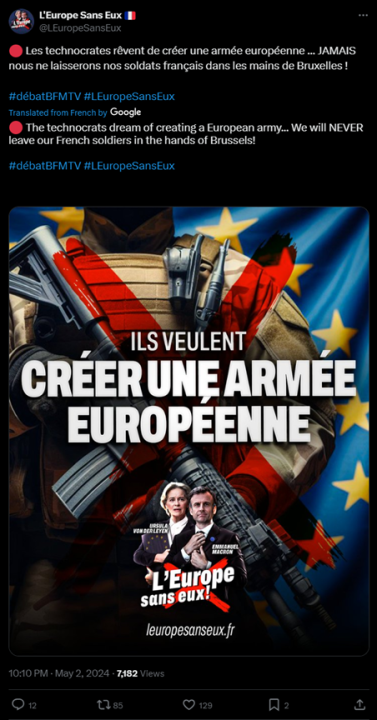
On the campaign’s website, the DFRLab observed at least three AI-generated images used to illustrate petitions against the EU’s “contempt for peoples,” “massive immigration,” and “promotion of the hijab.”

ID shares AI-generated content through its French websites
ID’s French website, idecrypte.eu, appears to be one of the platforms used to spread AI-generated political messaging. The website, which shares a backlink and an IP address with the Rassemblement National website, according to host.io, published posters featuring AI-generated elements with the purpose of enticing the group’s sympathizers to share them on social media.
![A screen capture from host.io showing connections between idecrypte[.]eu and the website of the French far-right party Rassemblement National. (Source: @gyron_bydton via host.io/archive)](https://dfrlab.org/wp-content/uploads/sites/3/2024/06/image-17.png)

Despite ID signing the April 2024 code of conduct, its French website published at least three posters using AI-generated images of migrants. The visuals were shared by the group’s social media accounts on X, Facebook, and Telegram. The posters called for MEPs to abstain from voting for the migration pact.

The group has been found to regularly use these images in posts on Facebook, X, Telegram, and their website, notably as sharing material for supporters wishing to amplify ID petitions, since at least October 2023. ID’s Facebook page in France also posted various sponsored ads featuring videos with AI-generated images, the first of which appeared on October 20 on Telegram and X, claiming that Europe was “facing an alarming migration crisis.”
The video features nine AI-generated images depicting migrants, the EU flag and institutions, protests, and explosions. According to the Meta Ad library, the video garnered a reach of 29,406 on Facebook and Instagram.
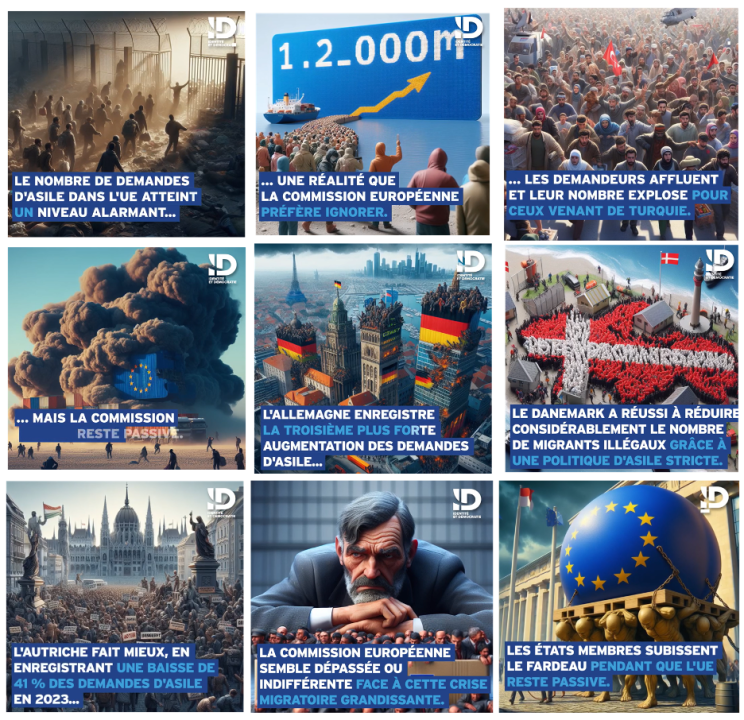
Italian deputy PM posts AI-generated content on X
On X, Italian Deputy Prime Minister Matteo Salvini published AI-generated images on social media that denigrated migrants and the LGBTQ+ community. Most of the posts, which spanned from May 22 until June 4, featured political posters with the slogan “Less Europe, More Italy: I Vote Lega,” along with the hashtag #8e9giugnovotoLega (#IVoteLegaOnJune8and9). These findings are consistent with findings of the Alliance4Europe’s election monitoring group, which flagged the use of non-watermarked AI-generated images by Salvini as a potential infringement to the code of conduct.

Using Meltwater Explore, the DFRLab also found that a May 22 engagement spike on X was consistent with a Salvini post featuring an AI-generated pregnant man, which garnered more than 2,800 mentions, 2,600 likes and 612,000 views.
In addition, Salvini posted an AI-generated image regarding allegations that Muslim children “refused to study Dante at school.” One image depicted children wearing hijabs and backpacks, while the other featured bearded men dressed in a stereotypical fashion burning a copy of Dante’s “Divine Comedy.”

As noted by French news outlet Le Parisien, Salvini recently posted an image depicting French President Emmanuel Macron wearing a camouflage uniform with an EU armband. Salvini has on various occasions expressed his opinions against military support of Ukraine and has called out the French president publicly after French authorities announced they would deploy military instructors in Western Ukraine.
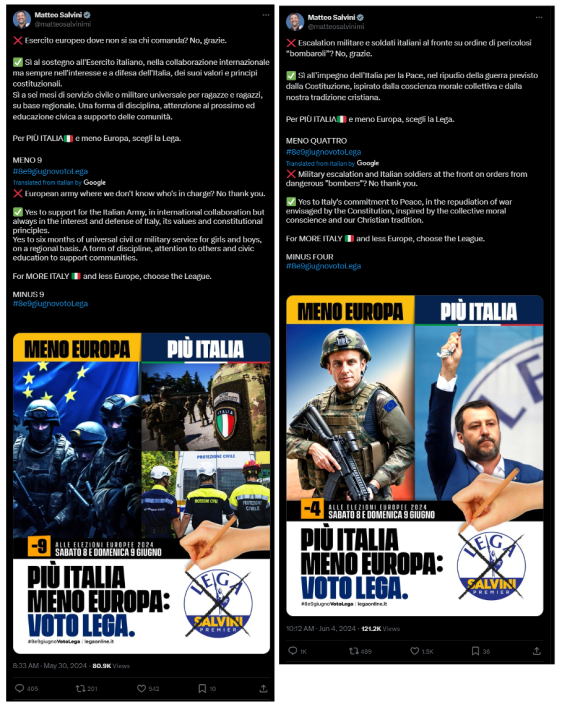
AI-generated content targeting Valérie Hayer and Emmanuel Macron
The DFRLab found that X accounts in France launched a campaign against European Parliament candidate and former majority leader Valérie Hayer that also utilized generative AI images. The campaign utilized the hashtags #HayerLaGuerre “Hayer the War” and #BesoinDeGuerre (“Need of War”), the latter likely in response to Hayer’s own social media campaign hashtag #BesoinDEurope (“Need Of Europe”). These posts accused Hayer of being responsible for the war in Ukraine and pushing for more weapons support to Ukraine.
Campaign posts that received the most engagement belonged to X user @UrticaUrtica, who employed AI-generated images attacking the French ruling party, Renaissance. At the time of writing, nine of the top ten posts with the most retweets using the hashtag #BesoinDeGuerre belong to @UrticaUrtica. Among these, the top two posts accused the party of sending soldiers to Ukraine and not focusing on domestic political issues such as poverty, healthcare, violence, and lower educational achievements.

On at least one occasion, @UrticaUrtica’s AI-generated posters ended up on public display during the campaign.

On X, the far-right political movement Reprenons le contrôle (“Let’s take back control”) posted AI-generated images of Macron and von Der Leyen, the former dressed as Abraham Lincoln and the latter wearing the EU flag as a hijab. These and other AI images are also heavily featured as shareable material on the movement’s website.
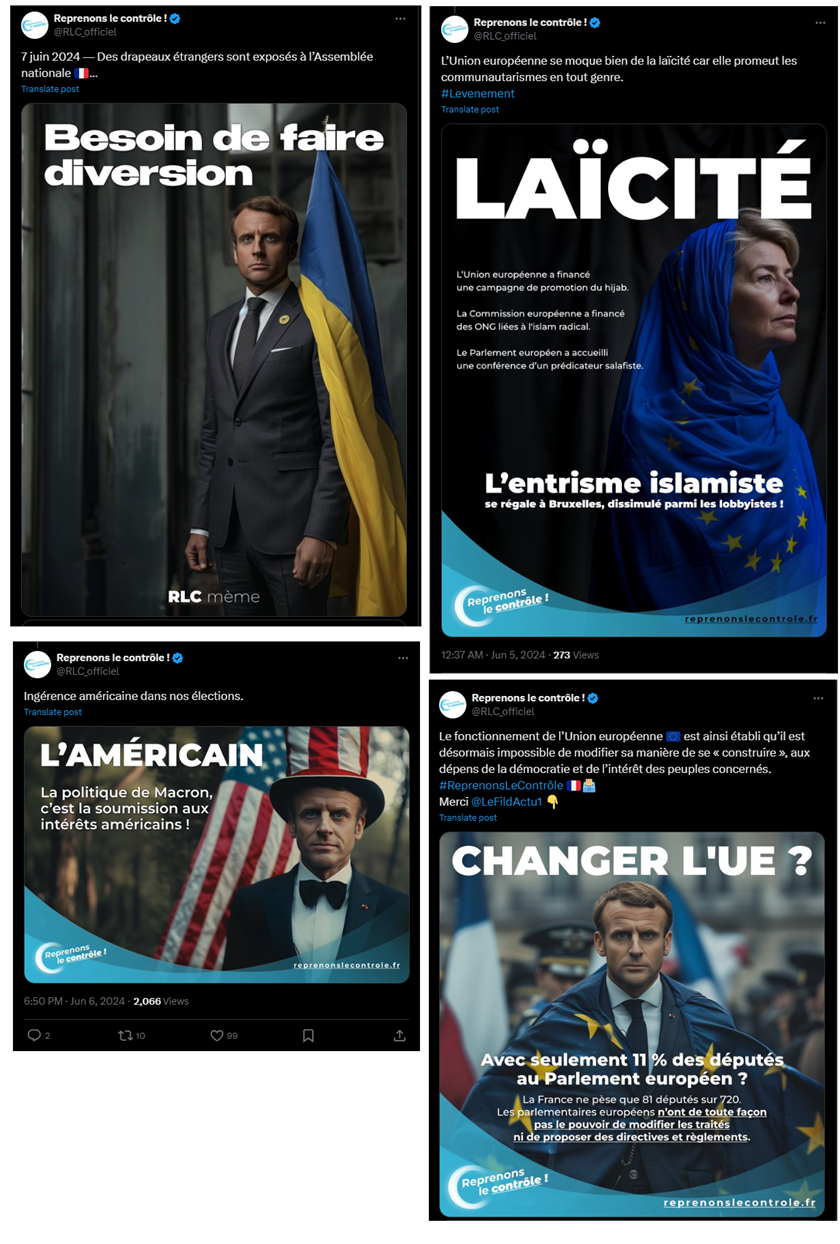
AI-generated songs on TikTok
On TikTok, the DFRLab observed two occasions during which AI-generated songs were used in support of Rassemblement National. The account @rn.musique published a video of a concert overdubbed with an AI-generated song celebrating Rassemblement National’s top candidate, Jordan Bardella. There are two version of the AI-generated song, the longer of which is titled “original soundtrack,” while the shorter version is labeled “Bardella our King.” While the longer version was flagged by @rn.musique as “created using AI,” the shorter version was not. Both versions appear to have been released on May 19, 2024.

At the time of writing, @rn.musique’s sixty-two TikTok posts garnered more than 1.3 million likes and 37,000 followers. The account also appears to have repurposed footage of a 1998 Celine Dion concert to give the impression that Dion was singing a song in support of Bardella.
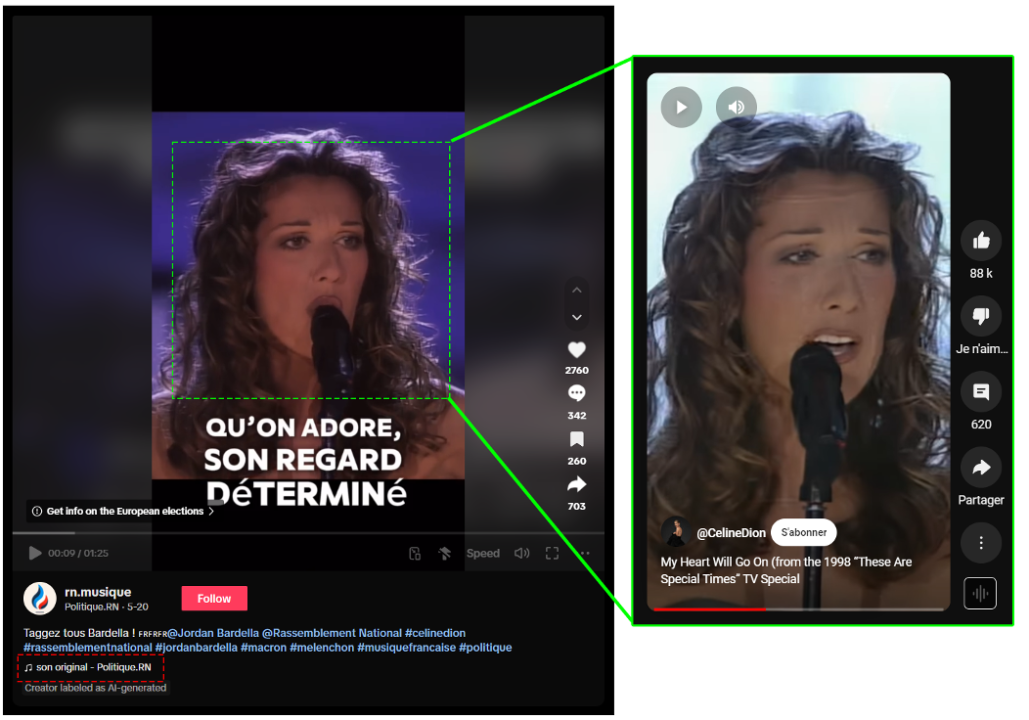
The shorter version of the song has appeared in more than 120 other TikTok videos supporting Bardella.
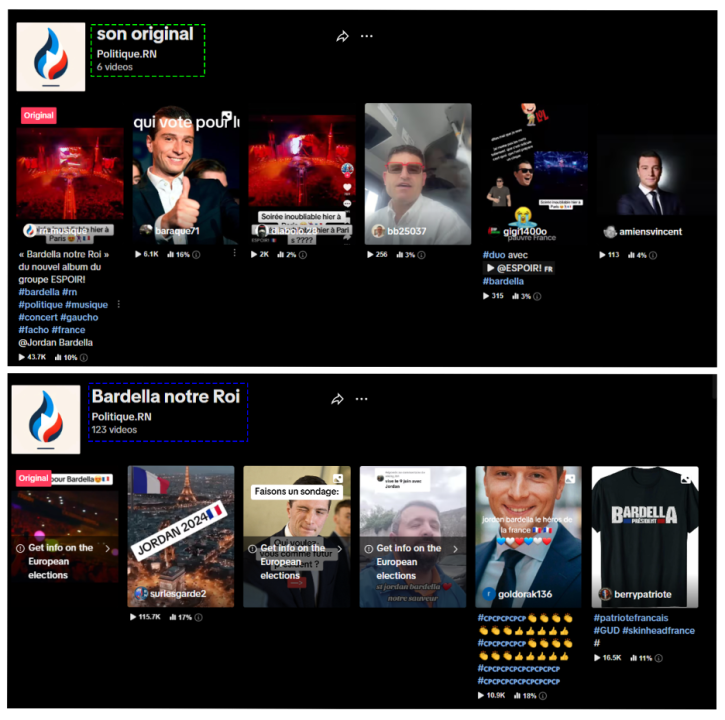
It remains to be seen whether ID or its member parties, France’s Rassemblement National and Italy’s Lega, will face any consequences for violating the code of conduct. As for individuals such as @UrticaUrtica and political movements like Reprenons le contrôle, they are not party to the code.
Cite this case study:
Valentin Châtelet, “Far-right parties employed generative AI ahead of European Parliament elections,” Digital Forensic Research Lab (DFRLab), June 11, 2024,

